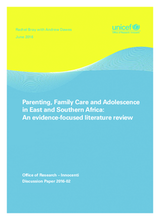This paper examines existing knowledge on raising adolescents in east and southern African countries, including Kenya, Malawi, Mozambique, South Africa, Tanzania and Zimbabwe. According to the report, and within the context of these regions, parenting is understood to be handled through extended community and family networks. These relationships facilitate a child’s progression into adulthood. Several factors impact an adolescent’s healthy transition into adulthood. They include poverty, HIV, workloads and education. Into adolescence, relatives remain a key support, adolescents often look outside the family for support in order to avoid intra-family conflicts.
Overall, the literature review found that parental capicity to shape their children’s lives depended on many factors and are often subordinate to the roles played by community ties. The report states that if parental ties are weakened, children are more susceptible to illness, violence, and exploitation.
The findings suggest the following:
- Replacing concepts of parenting based on (one-way) provision and guidance with those that allow for reciprocity within and between generations;
- Broadening understandings of the goals of care in the region in ways that enable enquiry into how families champion adolescents, defend their reputation, facilitate their integration and status within society and uphold their potential to succeed despite the odds;
- Identifying areas of misalignment between culturally prescribed parenting practices followed in the region, and those embedded in parenting programmes imported from the global North. This will serve to enable a fuller understanding and strengthening of existing support to both carers and their adolescents, and to reduce the risk of resistance to potentially helpful resources, including programmes.

